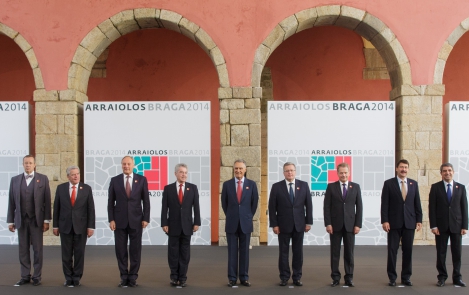-
Reset
+


Pictorial news: heads of state discussed Europe’s energy independence from Russia
30.09.2014
President Toomas Hendrik Ilves, who is on a working visit to Braga, participated in a discussion on important energy questions related to the security of the European Union with the other heads of state at the meeting of the Arraiolos Group. The topics included energy independence from Russia and possible alternative solutions for the countries' energy supplies.
Speaking about Europe's energy independence, President Toomas Hendrik Ilves noted that, in light of the events in the south and east – in North Africa, Iraq and Ukraine – the field of energy security requires heightened attention.
"If until now, we were able to speak about the need to improve energy security in a theoretical context without any time pressure, then the current political situation requires decisive action on our part," President Ilves said. "Dependence on Russia's gas, coal and oil is a field of activity that is clearly related to the security of all European countries, which means that a pan-European approach is needed for finding a solution."
President Ilves emphasised that Russia uses the supply of energy as a political weapon. "We in Estonia have seen this for the last 23 years. In 1991, when we regained our independence, Russia stopped supplying Estonia with energy that same winter; we survived the 1991-92 winter thanks only to the petroleum we bought from Finland," the head of state recalled.
According to President Ilves, the European Union must implement a plan of action to reduce its energy dependency on Russia. "This does not mean that we have to give up Russian gas all together but, considering the fact that Russia uses energy as a means of applying political pressure, more competition needs to be developed and various alternatives found. We must end the situation whereby Russia can use energy to politically and economically pressurise Ukraine and its other neighbours," he added.
President Ilves said the Estonia supports the declaration presented to the European Council in June by Poland, Portugal and Spain regarding the reduction of the European Union's energy dependency. The declaration emphasised that Europe must first of all abolish the isolated energy islands in the European Union's internal market, allocate additional monies from European Union co-financing to the member states for infrastructure development, create a uniform solution for concluding energy contracts with third countries and develop domestic energy sources.
The isolated electricity and gas islands in the European Union's internal market are especially vulnerable in the worsening security situation, President Ilves noted. He added that in the light of the Ukrainian conflict, greater attention will hopefully be paid to our regional gas projects with Finland and the connections between the Baltic region and Central Europe. "By 2025, Estonia hopes to be 100% detached from Russia's energy system," he added.
At the meeting in Braga, the presidents also discussed Europe's current problems in the fields of migration and employment.
President Ilves also discussed defence-related cooperation with Portugal at a bilateral meeting with Aníbal Cavaco Silva, the Portuguese Head of State. Portugal participated in the Baltic Air Policing Mission in 2007 and will again participate in the on-going rotation from September to December of this year with six airplanes. According to President Ilves, Portugal's views regarding the Ukraine crisis and the sanctions against Russia are practically identical to Estonia's positions. "We have productive bilateral relations with Portugal, with tourism being a very promising field of activity. I am glad to see that TAP Portugal, the Portuguese national airline, began several direct flights per week between Lisbon and Tallinn this summer," President Ilves said.
At the invitation of Aníbal Cavaco Silva, the Portuguese Head of State, the participants at this meeting of the Arraiolos Group include Estonian President Toomas Hendrik Ilves, Latvian President Andris Bērziņš, Polish President Bronisław Komorowski, German President Joachim Gauck, Finnish President Sauli Niinistö, Hungarian President János Áder, Austrian President Heinz Fischer and Bulgarian President Rosen Plevneliev.
The Arraiolos Group is the name for a series of informal meetings launched in 2003 and bringing together heads of state who, according to their respective constitutions, do not take part in the sessions of the European Council. This is the tenth such meeting, the first of which was held by the President of Portugal, Jorge Sampaio, in Arraiolos, Portugal, and included the heads of state of Latvia, Poland, Germany, Finland and Hungary. At the 2005 meeting in Helsinki, the circle of participants grew with Austria and Italy joining the group. In 2011, Slovenia was invited and Estonia and Bulgaria were invited last year.
The head of state will arrive back in Estonia late tonight.
Office of the President
Public Relations Department
Phone +372 631 6229




